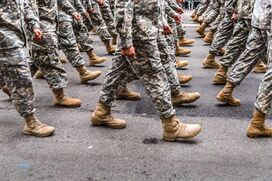
Defense spending to increase in coming months
On Dec. 23, President Obama signed the National Defense Authorization Act for Fiscal Year 2017, which will increase defense spending to $619 billion. According to Military Times, this will, in part, translate to $550 more per year, per soldier for enlisted troops and $1,800 per officer. The act also provides the Department of Defense and the Department of Energy with more flexibility to combat cyber attacks.
Here's what this defense spending increase could mean for job seekers:
Cyber security is important
In 2016, information was revealed about the scope and frequency of cyber attacks on government departments. Some agencies are hit with as many as 10 million attacks each month - and while many of these fail to breach security measures, a few do slip through the cracks. This kind of threat from individual and foreign-government-sponsored hackers is likely what prompted this act to have provisions specifically targeted at improving the nation's cyber security.
"Provisions will affect cyber security."
As the President noted in his statement on signing the act, provisions within the law give the Department of Defense and the Department of Energy more flexibility in how they deal with unmanned aerial vehicles as well as cyber attackers. For job seekers, this could mean more opportunities to work with the federal government to shore up defenses against these prevalent threats.
Will more defense spending translate to more jobs?
It's still to be seen if this increase in defense spending - $3.2 billion more than President Obama requested - will translate into more jobs within the federal government. That said, the future of job growth within the realm of defense seems secure for the next year, at least. The act not only gives troops their largest pay raise since 2010, but it also provides valuable benefits to military personnel and their families. This could attract more people to careers within the military. Military Times noted that the Army end strength will be set at 476,000 soldiers - 16,000 more than requested by the White House.
Likewise, the act's provisions for increased cyber security will likely draw more attention from talented security professionals in the civilian world. "With or without an increase in funding, we as a nation need to consistently evolve in our approach to cyber security," comments Mike Boyles, DivisionManager of Beacon Hill's National Security Division in Washington, D.C. "We recognize that talented IT security professionals will be in constant demand. That is why we have prioritized attracting more Computer Network Defense resources to support our government clients and to ensure that our team remains progressive and forward-thinking. Our proactive strategy harkens back to an old football adage: the best defense is oftentimes a good offense." Recruitment for those with top-tier cyber defense specialties could rise in 2017. Job seekers in that field should keep an eye on open positions at various agencies throughout the federal government.
 Back to Top
Back to Top

